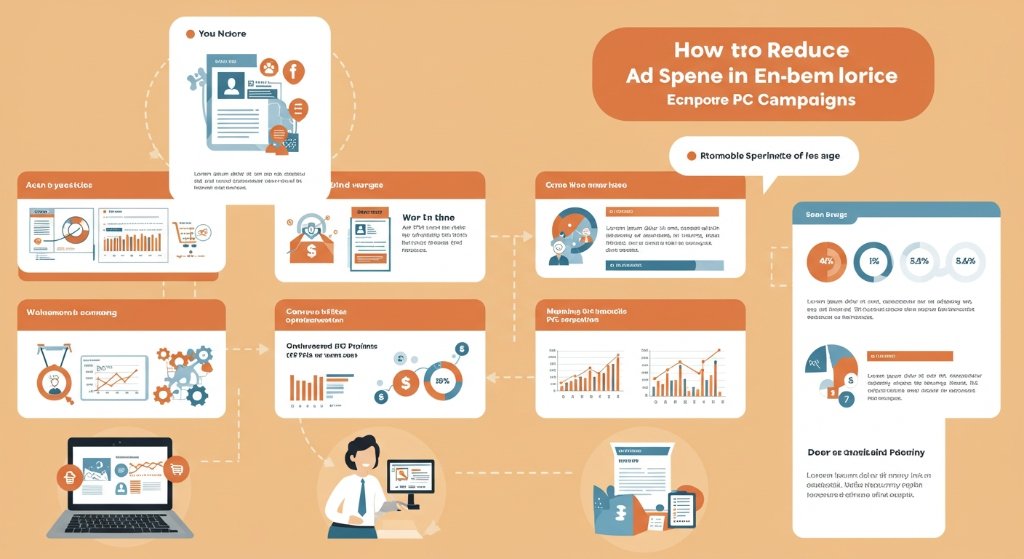Advertising is a key driver of success for eCommerce businesses. But with so many dollars pouring into pay-per-click (PPC) campaigns, making sure that every dollar yields a solid return has never been more important. Wasted ad spend doesn’t just eat into your marketing budget; it also limits your growth potential in an increasingly competitive market.
This guide will walk you through actionable strategies to reduce ad spend wastage in your eCommerce PPC campaigns. Whether you’re already working with an eCommerce PPC agency or are just running Google Ads on your own, these tips will help you fine-tune your approach, achieve better targeting, and ultimately boost your returns.
Why Wasted Ad Spend Hurts eCommerce Businesses
When you’re an eCommerce business owner, every cent matters. Spending on ineffective PPC strategies means you’re not only burning cash, but you’re also missing out on valuable opportunities to engage your target audience and drive conversions.
Consider this:
- Over 50% of paid search clicks go to the top four results on Google Ads. This means improperly structured campaigns could push you out of this winning zone.
- Google Ads waste as much as 25% of ad spend on irrelevant or untargeted audiences, according to industry studies.
Understanding how and where these inefficiencies occur is the first step to reducing waste.
6 Strategies to Reduce Ad Spend Wastage in eCommerce PPC Campaigns
Conduct Thorough Keyword Research
Keywords are the foundation of your PPC campaigns. Targeting the wrong ones can lead to wasted clicks and minimal ROI.
Tips to Get It Right:
- Focus on long-tail keywords. These are more specific, less competitive, and often have a higher intent to purchase. Example: Instead of bidding on a generic keyword like “laptops,” target “best laptops under $1000.”
- Regularly review your search terms report in Google Ads to uncover irrelevant queries driving clicks. Use negative keywords to filter them out.
- Leverage tools like SEMrush, Google Keyword Planner, or Ahrefs to find high-converting keywords that align with your products.
Target the Right Audience
Even with perfect keywords, inefficient audience targeting can sabotage your efforts.
How to Optimize Audience Targeting:
- Use demographic-specific targeting to zero in on your ideal customers. Age, gender, income level, and interests play a crucial role in purchasing behavior.
- Take advantage of lookalike audiences to find people similar to your existing customers.
- For eCommerce businesses with existing customer data, set up customer matching to serve ads to previous buyers or re-target abandoned cart users.
Use Negative Keywords Carefully
Negative keywords are one of the simplest yet most overlooked methods to reduce ad spend wastage. Adding them to your campaigns ensures your ads don’t appear for irrelevant queries.
Example in Action:
Imagine your eCommerce business sells high-end watches. Without negative keywords, your ads could show up for phrases like “cheap watches online.” By adding “cheap” as a negative keyword, you immediately filter out searches that aren’t aligned with your brand.
Improve Your Quality Score
On Google Ads, Quality Score significantly impacts your ad rank and cost-per-click (CPC). A higher Quality Score means your ads are served to better-fit audiences at a lower cost.
Steps to Improve Quality Score:
- Write engaging, relevant ad copy that matches both the search intent and the landing page content.
- Ensure your landing pages load quickly, are mobile-friendly, and directly relate to your PPC campaigns. Example: If your ad promotes “vegan protein powder,” make sure your landing page focuses exclusively on this product.
- Continuously optimize your click-through rate (CTR) by A/B testing ad creatives and messaging.
Optimize Ad Schedules
Running ads 24/7 might seem appealing, but it’s rare for all hours to deliver optimal results. By analyzing historical data in your PPC campaigns, you can determine when your target audience is most active and ready to convert.
Pro Tips:
- Use Google Ads’ ad schedule feature to adjust bids for specific days or times when conversion rates are highest.
- For a seasonal eCommerce store, such as one selling Christmas decorations, increase bids during high-demand periods and turn off campaigns during off-seasons.
Monitor Your Campaigns Like a Pro
PPC campaigns are NOT a “set-it-and-forget-it” marketing strategy. Continuous monitoring and tweaking are essential for maximum efficiency.
What to Watch For:
- Underperforming Ads: Pause or revise ads with low CTR and conversion rates.
- Conversion Tracking: Ensure your Google Ads are properly linked to analytics platforms so you can identify actual sales driven by your campaigns.
- Budget Allocation: Shift budget from low-performing keywords, ads, or campaigns to those delivering better ROI.
If you’re feeling overwhelmed, working with a Google Ads Specialist or partnering with a reliable PPC agency can help you identify and resolve inefficiencies.
Bonus Tip: Retarget for Maximum Impact
Retargeting ads serve as gentle reminders to customers who’ve previously interacted with your brand but didn’t convert. For example, show a retargeting ad to a user who added a product to their cart but didn’t complete the purchase. Retargeting campaigns typically deliver higher ROI due to their focus on warm leads.
Platforms like Google Display Network and Facebook Ads make setting up retargeting campaigns easy, giving you a cost-effective way to nurture potential customers.
Make Your Ad Spend Work Smarter
Reducing ad spend wastage in your eCommerce PPC campaigns isn’t just about cutting costs; it’s about ensuring every dollar works toward driving meaningful results. Start by refining your keywords and audience targeting, experimenting with ad scheduling, and continuously monitoring your campaigns.
If you’re unsure where to start, consider partnering with a professional eCommerce PPC agency or hiring a Google Ads Specialist. A little expert guidance can go a long way in turning your ad campaigns into profit powerhouses.
Now’s the time to take control of your PPC strategy. Stop wasting money and start generating real results for your eCommerce business.

